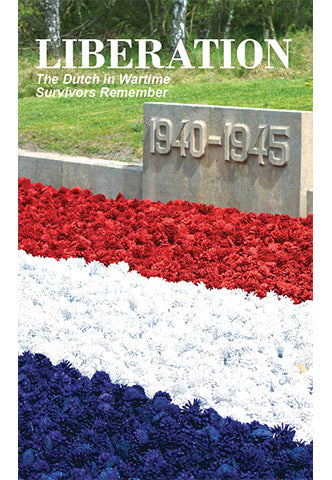Dutch the store
Liberation
Couldn't load pickup availability
The Dutch in Wartime: Survivors Remember is a series of books with wartime memories of Dutch immigrants to North America, who survived the Nazi occupation of The Netherlands.
Book 9, Liberation, the last book in the series, contains memories of the final months of the war and the liberation of the country. The Dutch are starving. As battles rage around them they desperately await relief from famine and tyranny. When allied troops enter the towns and villages of the plundered country, euphoria sets in, only to be tempered by the full realization of the terrible losses suffered.
Designed and written to be easily accessible to readers of all ages and backgrounds, these books contain important stories about the devastating effects of war and occupation on a civilian population.
Edited by Anne van Arragon Hutten.
114 pages
Historical background, resistance poem, map and 42 wartime memories.
ISBN: 978-0-9919981-0-4
On the cover: ‘Waalsdorpervlakte’, site in the dunes outside The Hague where more than 250 people were executed by the Nazis. An annual commemoration is held there on May 4, Dutch Remembrance Day. (Photo: JvL)
READ AN EXCERPT
I was born in Culemborg, close to Utrecht, and was sixteen when the war began.
My father was a cigar maker, and I worked in a clothing workshop. We only had one slice of bread a day each, with ten children at home. I can still see my father slicing bread in the evenings, saying: “You can have your slice of bread tonight or you can have it for breakfast in the morning.” Potatoes were scarce too. We had to save the potato peels, which Mom would boil the next day and mash with red cabbage or whatever was available.
I used to sew for people on a farm and when I went there they gave me a nice meal. But even these people had no meat, so there was no gravy. The lady used white sugar and browned it in a frying pan, then added a spoonful of lard, and water, and that was the gravy. When she gave me a piece of bread she would put lard on it instead of butter.
Towards the end of the war there were no potatoes any more. The Germans used them to shoot off their V2s (they made methanol from potatoes). Two of my older brothers spent two years in German work camps, so it was my job to go to the Central Kitchen for soup. We often went to bed hungry. When those airplanes came over and dropped those big crates of food, oh my! I still remember those great big cans of bully beef, canned meat.
I very much remember the Canadian soldiers who liberated us, since I married one of them. They were our angels of mercy. I first saw two military policemen on motorbikes coming into town. They wore white cuffs and puttees. I still get emotional thinking about it. They were followed by military vehicles that distributed chocolate bars and candy. I got a whole chocolate bar and ate it all. Being the oldest in my family, I was tired of having to share everything. But that chocolate made me miserably sick. My stomach had shrunk too much after many months of not having enough food.
I met this Canadian soldier at a dance, Manny Amirault. My sister and I brought him home to my family, and they gave him surrogate tea made from tulip bulbs. He took off for his unit and came back with a tin of real tea, and other foods. Within two weeks Manny asked me to marry him, and my parents quickly gave their consent. I always said that they traded me for tea and coffee. I made Manny wait three months before I married him. He went back to Nova Scotia without me. In 1946 I was one of the first war brides to leave The Netherlands. I got priority because I was pregnant. When I arrived in Canada I was 5’8” and weighed 105 pounds. During the war, everybody was thin.
Petronella Vanderdonk
Yarmouth, Nova Scotia

